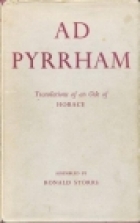For many years before his death in 1955 the diplomatist and statesman Sir Ronald Storrs made an avocation of collecting 50 translations of Horace's Pyrrha ode (Carm. 1.5). His collection, which by 1955 comprised several hundred versions, has since, under the supervision of Sir Charles Tennyson, increased to four hundred and sixty-three. From these Sir Charles has chosen for the present volume sixty-three English translations, twenty French ones, fifteen Spanish, thirteen German, twelve Italian, and twenty-one in other languages, including a Turkish prose version, several in various Slavic and Scandinavian tongues, a distressing Latin rewriting by a seventeenth-century German professor extolling his own connubial felicity, and (to the reviewer) impenetrable renditions into Maltese, Hebrew, Lettish, Hungarian, Finnish, and Welsh.
That, my friends, is what I call a collector. The text contains a total of 144 versions of Horace's famous poem (six of which are from Latin into Latin), from 25 different languages.
Ode to Pyrrha
What slender youth bedewed with liquid odoursNot only is Storrs' book uniquely singular in scope, but is of interest to our particular endeavor, as well. In what I believe is a preface written by Charles Tennyson, Storrs' editor, we find the following mention:
Courts thee on roses in some pleasant cave,
Pyrrha? For whom bind'st thou
In wreaths thy golden hair,
Plain in thy neatness? O how oft shall he
On faith and changèd gods complain: and seas
Rough with black winds and storms
Unwonted shall admire:
Who now enjoys thee credulous, all gold,
Who always vacant always amiable
Hopes thee; of flattering gales
Unmindful? Hapless they
To whom thou untried seem'st fair. Me in my vowed
Picture the sacred wall declares t' have hung
My dank and dropping weeds
To the stern god of the sea.Translated by John Milton
The French and German versions have been chosen by Mr. Richard Graves, a lifelong friend of Sir Ronald's, who is himself a distinguished translator, and Mr. Henry Reed has very kindly chosen the examples in Italian.
Reed, I need not remind you, went to university on a Latin scholarship, and is famous for twisting the words of Horace (Carm. 3.26) for the epigram to "Naming of Parts." I'll be adding Ad Pyrrham to my shortlist of items to track down at the nearest library, at which time I promise to post an updated photograph of my living room.








